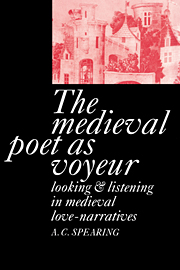Book contents
- Frontmatter
- Contents
- Preface
- 1 Theories of looking
- 2 Examples of looking
- 3 The Tristan story
- 4 Chrétien de Troyes
- 5 The Lanval story
- 6 Troilus and Criseyde and The Manciple's Tale
- 7 Partonope of Blois
- 8 The Knight's Tale and The Merchant's Tale
- 9 The Squyr of Lowe Degre
- 10 The Romaunt of the Rose
- 11 The Parliament of Fowls and A Complaynt of a Loveres Lyfe
- 12 The Palice of Honour and The Goldyn Targe
- 13 The Tretis of the Twa Mariit Wemen and the Wedo
- 14 Phyllyp Sparowe
- Notes
- Bibliography
- Index
11 - The Parliament of Fowls and A Complaynt of a Loveres Lyfe
Published online by Cambridge University Press: 20 August 2009
- Frontmatter
- Contents
- Preface
- 1 Theories of looking
- 2 Examples of looking
- 3 The Tristan story
- 4 Chrétien de Troyes
- 5 The Lanval story
- 6 Troilus and Criseyde and The Manciple's Tale
- 7 Partonope of Blois
- 8 The Knight's Tale and The Merchant's Tale
- 9 The Squyr of Lowe Degre
- 10 The Romaunt of the Rose
- 11 The Parliament of Fowls and A Complaynt of a Loveres Lyfe
- 12 The Palice of Honour and The Goldyn Targe
- 13 The Tretis of the Twa Mariit Wemen and the Wedo
- 14 Phyllyp Sparowe
- Notes
- Bibliography
- Index
Summary
Unlike Guillaume de Lorris, Chaucer never presents himself in his poems as a lover with experience or expectation of success. We have seen this exemplified in Troilus and Criseyde, where he appears as a clerkly translator, investigating a love-affair from the remote past, and needing to consult ‘clerkes in hire bokes olde’ (III 1199) even to discover how Criseyde trembled when Troilus embraced her. The same is equally true of the dream-poems that precede Troilus, even though there Chaucer as dreamer cannot avoid being at the centre of his dream. The earliest, The Book of the Duchess, comes nearest to presenting him as a participant in the love which is the courtly poet's required subject-matter. In its 43-line prologue Chaucer appears as a melancholy victim of love-sickness (though even there the sickness must be due to failure); but the melancholy leads to a dream and a poem about someone else's success rather than a narrative of his own cure by the ‘phisicien but oon’ (39) who could assist him. In the dream, Chaucer is a sympathetic but naïve questioner of the poem's true ‘Amant’, a ‘man in blak’ (445) who is a figure of John of Gaunt, mourning his first wife's death. Here Chaucer learns about love not from ‘myn auctour called Lollius’ (Troilus I 394) but from a living authority of high rank and thus capacity for romantic feeling.
- Type
- Chapter
- Information
- The Medieval Poet as Voyeur , pp. 211 - 230Publisher: Cambridge University PressPrint publication year: 1993



